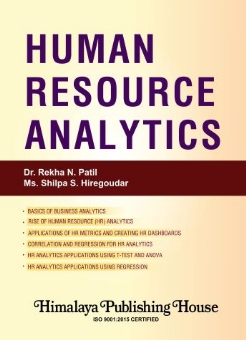Human Resource Analytics
by Dr. Rekha N Patil & Dr. Shilpa S. Hiregoudar
HR Scorecard
An HR scorecard provides a framework for measuring Human resources. It is designed with the balanced scorecard measurement framework. This framework, as we know, is developed based on four properties i.e, financial, internal process, customer and learning/ growth
Often organisations hurriedly go for measurementbut qualifying HR measurables requires understanding the operating metrics that need to be measured so that the scorecard can effectively help in the HR decision making process. The strategic alignment of HR fuctions by mapping critical HR supports such as Performance Management Systems, Innovation, Training and Development will demonstratte the HR value contribution in achieving organisational business and strategic intents
HR scorecard will need the following perspectives:
Financial perspective - Reducing the costs related to HR/ reducing turnover rates/ Employee absenteeism/ Workers' compensation/ Employee satisfaction/ Employee engagement/ Employee benefits
Internal perspective: - Turnover rates/ Manager performance and ratings/ overall employee satisfaction/ recruitment/employee retention data, employee referrels, social media - LinkedIn referrals etc.
Learning and growth perspective: Communication and Performance improvements/ pinpoint opportunities for improvement./ ease of access to data by every department and their ability to understand the data.
Customer Perspective: Goal setting/ consistent customer interaction / customer retention/ return customer rates/ employee productivity/ customer service goals
Developing the HR Measurement system
HR scorecard measurement system allows a business to tangibly monitor its performance. The steps involved in developing a HR scoreccard Measurement system are:
Assessing the Corporate culture: Assessing the Service ratio/ Safety initiatives/ low cost labour/ innovative inputs/ technology costs/ etc
Operational or Outcome: turnover statistics/ minimising wastage of resources/ measaurs of efficiency in output with respect to department say, no of orders received/ no of units produced etc.
Compiling the metrics: Outcome based HR goals - sopft skills training imparted for better marketing exposure/ Health and safety training/ SMART methodologies for each scorecard to be specific, measurable, achievable, relevant and time constrained
Linking HR Data to operational performance:
1. HR Reports
2. HR Dashboards with Key Performance Indicators (KPIs)
3. HR Scorecards
The key performance Areas
4. Customer Metrics
5. Process Metrics
6. Talent Metrics
7. Financial Metrics

